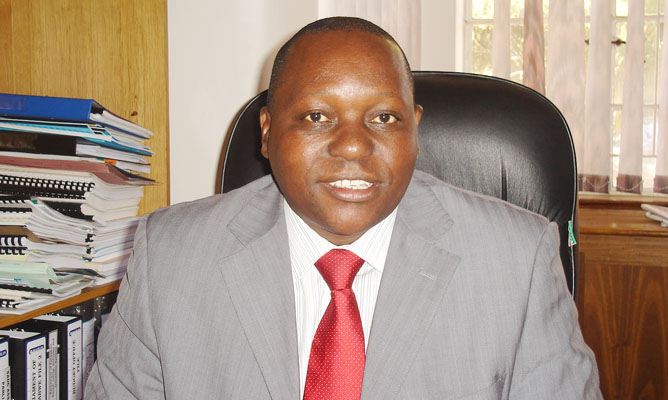
Local governance issues are set to take centre stage in Parliament after gazetting of the Local Government Laws Amendment Bill and the lodging of a petition in Parliament by several civil society organisations who are concerned about non-implementation of constitutional provisions on devolution.
John Makamure
The Local Government Amendment Bill seeks to align, albeit piecemeal, the Rural District Councils Act [Chapter 29:13] and the Urban Councils Act [Chapter 29:15] with Section 278 (2) and (3) of the Constitution.
Section 278 (2) states that an Act of Parliament must provide for the establishment of an independent tribunal to exercise the function of removing from office mayors, chairpersons and councillors. Any such removal must only be on the following grounds: inability to perform the functions of the office due to mental or physical incapacity; gross incompetence; gross misconduct; conviction of an offence involving dishonesty, corruption or abuse of office; and wilful violation of the law, including a local authority by-law. Section 278 (3) categorically states that a mayor, chairperson or councillor of a local authority does not vacate his or her seat except in accordance with this section. This means removing elected officials at local level on any other grounds would be unconstitutional.
The Local Government Amendment Bill is reacting to Justice Mary Dube’s judgement on an application by Harare mayor, councillor Bernard Manyenyeni challenging his suspension by the Minister of Local Government Saviour Kasukuwere and the other judgments that have barred the minister from removing elected officials.
Because it is a reactive piece of legislation aimed at addressing a specific issue that has arisen, the Bill is generally not good law because it is ignoring a host of other priority local governance issues that stakeholders have been crying that they be addressed. Such a piecemeal approach to law-making in a country that has to urgently fully align its laws with the Constitution is unacceptable.
It is also bad law because the minister still has a hand in the removal of elected local government officials when the Constitution explicitly confers such powers to the tribunal. Even the manner in which members of the tribunal are appointed can be subject to a constitutional challenge. There is too much ministerial involvement in the appointment process when section 278 of the Constitution says the tribunal must be independent.
- Chamisa under fire over US$120K donation
- Mavhunga puts DeMbare into Chibuku quarterfinals
- Pension funds bet on Cabora Bassa oilfields
- Councils defy govt fire tender directive
Keep Reading
Chapter 14 of the Constitution is dedicated to provincial and local government. The preamble to this chapter is that there must be devolution of power and responsibilities to lower tiers of government in Zimbabwe. Some of the objectives of this devolution are outlined as: to give local powers of governance to the people and enhance their participation in the exercise of the powers of the State and in making decisions affecting them; to recognise the right of communities to manage their own affairs and to further their development; to ensure the equitable sharing of local and national resources; and to transfer responsibilities and resources from the national government in order to establish a sound financial base for each provincial and metropolitan council and local authority.
The Constitution requires provincial and metropolitan councils to be set up to administer local governance issues and ensure devolution achieves the intended objectives. However, three years into the new Constitution, the councils are yet to be established. It does not appear like the authorities are even contemplating establishing them in clear violation of the supreme law.
One would have expected Kasukuwere to include in the Local Government Amendment Bill provisions that establish the provincial and metropolitan councils. The argument that the government does not have resources to finance these structures has no merit. This is because there are many other government structures and institutions that continue to be set up, which in my view, are not a priority.
Local governance is to do with the people and should receive adequate attention than for example, setting up several ministries and departments that duplicate functions and are a severe drain on the fiscus.
Concerned by lack of commitment to devolution, the Public Policy Research Institute of Zimbabwe, with support from 57 civil society organisations country-wide, recently petitioned Parliament on the issue. They called on Parliament to exercise its power and ensure that relevant government ministries and departments implement Chapter 14 of the Constitution of Zimbabwe. The organisations said they were “disturbed” that the country’s local governance architecture had remained unchanged since the enactment of the Constitution in July 2013, and had failed to take cognisance of Chapter 14 of the Constitution. The result was that citizens were unable to influence and participate in decision-making, thus building strong local democracies.
The petition has since been referred to the Local Government Portfolio Committee of Parliament for consideration. The committee is expected to call in other interested organisations to make their own submissions on the petition before coming up with a report for tabling in the House.
It is my hope that the report, together with the Bill, will generate intense debate in the House and result in an alignment process that is more comprehensive and fully addresses the spirit of the Constitution of an open society, fostering fundamental human rights and freedoms, the rule of law, equality of all human beings, separation of powers between the three arms of government and accountability of institutions and agencies of government to the people through Parliament. I am afraid the Local Government Amendment Bill does not fulfil these key fundamentals of a democratic Constitution.
l John Makamure is the executive director of the Southern African Parliamentary Support Trust. Feedback: [email protected]












